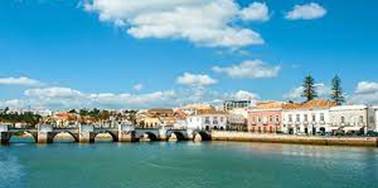Tavira & Ria Formosa
Tavira the architectural beauty in the Eastern Algarve, Portugal
Tavira is one of the architecturally most attractive towns in the Algarve. Its origin dates back around 2.000 BC, and during the Moorish occupation the fishing industry of this town was of great importance. In the 17th Century its port, located at the Gilhão River, played a significant role shipping wine, salt and dried fish. After the earthquake in 1755 the town has been completely rebuilt with many fine 18th Century buildings and 37 churches. The church of Santa Maria do Castelo has been erected on the site of a Mosque.
The surrounding of Tavira is still very rural but slowly changing due to the demands of the tourist industry and three golf courses opened recently nearby.
Ilha de Tavira opposite Tavira is part of the island chain of the Ria Formosa that extends from Faro to Cacela-a- Velha east of Tavira, protecting the unique lagoon system against the rough Atlantic Ocean. The beach can only be reached by a ferryboat that takes the visitor to the sandy-bar island of Ilha de Tavira.
The island Ilha de Tavira stretches along the coast from the small village of Luz de Tavira to the north-east until reaching Tavira. The famous beach Praia do Barril is located in the centre of the island. Access from the coast at Pedras d’el Rei is by a small pontoon bridge and the 1 km crossing to the island is either on foot or by small train. The former fishermen’s sheds now house various tourist facilities such as toilets, shops and restaurants. Nearby a row of anchors among the dunes is a testament to the glorious past of tuna fishing in the Algarve and these anchors fixed the nets to the ground.
Further to the east the island gets smaller; the small beach Praia da St. Luzia opposite the village of St. Luzia with a width of only 50m is also known as Praia da Terra Estreita (Narrow Beach) .
There is also an official nudist beach on the Ilha de Tavira, Praia da Homem Nu on the most western corner of the island.
Watch the promotional video of Tavira ( in Portuguese):


